21st May 2015
Question: What should one who is reciting the Qur'aan do when Athaan begins?
Answer: When one hears the Athaan whilst reciting the Qur'aan Shareef, end the aayat, listen to the Athaan and respond in the Masnoon manner. One should not continue reading.
3rd May 2015
Question: If I join the Jamaat after missing rak'at(s), then while waiting in Tashahhud for the Imaam to make Salaam, should I recite Durud and Du'a as well?
Answer: When you sit with the Jamaat in the Qa'dah, you should recite only Attahiyaat, not Durud. After Attahiyaat remain sitting silently until the Imaam begins his second Salaam. Then you get up and complete your missed rak'at(s).
3rd May 2015
Question: If heirs are aware that their deceased parents were liable for Qadha Salaat and Fasts, is it obligatory for them to pay fidyah or kaffarah?
Answer: If a wasiyyat (bequest) was made that fidyah, kaffarah, should be paid on their behalf, then it is compulsory to fulfil the wasiyyat from one third of their assets. If wasiyyat was not made, then it is not obligatory to pay fidyah, kaffarah, for the deceased. However, if they wish to do so, then each one should give from their voluntarily. Furthermore, nothing may be taken from the shares of minors.
3rd May 2015
Question: Is it necessary to be with wudhu when making Sajdah on hearing someone else reciting the relevant Aayat?
Answer: To make the Sajdah one has to have Wudhu. All the conditions necessary for Salaat are also necessary for the validity of Sajdah Tilawaat. Facing the Qiblah, donning taahir (clean) garments, etc are essential.
2nd April 2015
Saying "Salaam" is not the same as saying "Assalamu alaikum"; and one will not get the reward of saying "Assalamu alaikum" by saying "Salaam". Moreover, when someone is greeted with "Assalamu alaikum", it is compulsory on him to reply (by saying "Wa alaikumus-salaam" etc). However, if one is greeted with "Salaam", it is not compulsory to reply. This is because saying only "Salaam" is not the sunnah method of greeting someone.
20th March 2015
Question: If a Masbooq (late comer) commits an error whilst behind the Imaam, should he perform Sajdah Sahw?
Answer: There is no Sajdah Sahw for the Masbooq (late comer) if he commits any error whilst behind the Imaam, i.e. before the Imaam has terminated the Salaat. Thus, if in the Imaam's last rak'at, after Tashahhud he recites Durood Ibraaheem, Sajdah Sahw is not necessary.
13th March 2015
Question: What is the position of Salaah which one begins in the valid time but terminates after the expiry of the time?
Answer: If the sun begins to rise whilst Faj'r Salaah is being performed, it (Faj'r) will not be valid regardless of what ruku one may be in. If the sun sets whilst performing As'r salaah of that specific day, As'r will be valid. But, if the procrastination to this was due to carelessness, then one is guilty of a major sin for having performed As'r in defective time. If Duh'r, Maghrib and Isha Salaah are performed whilst those Salaah times are expiring, then these Salaah will be valid.
13th March 2015
Question: Is it possible to perform Qadha salaah after As'r Salaah?
Answer: Yes, it is permissible to perform Qadha Salaah after As'r. However, when it is about 15 minutes before sunset, then it is not permissible at such a time.
13th March 2015
In principle, the muqtadis (followers) will not recite Surah Fatiha or any other surah when following an Imam, regardless if it is a vocal prayer or silent prayer. They will remain silent and wait for the Imam to say the next takbeer.
27th February 2015
Question: At what point should the muqtadis follow the Imaam? Some muqtadis wait until the Imaam has reached the next position. Is this correct?
Answer: The muqtadis (followers) should move almost simultaneously with the Imaam, not before him. They should not delay until the Imaam has completed the movement.
27th February 2015
Family members - cousins, uncles, aunties etc., they can be given Zakah. In doing so, consider their honour and give them Zakah by stating it is a gift. Furthermore, they should be made outright owners of the Zakah and they could do as they wish with it.
2nd February 2015
As far as ones missed prayers are concerned, one must make up the Fardh (compulsory) and Wit’r prayers which one has missed since the age of maturity. If one is not able to calculate the precise number of missed prayers, one should make an overestimate until one is convinced that they have missed no more than that number.
13th June 2014
If blood comes out of the body of the deceased after the kafan has been put on. It will not be necessary to change the kafan. You could put a plaster or bandage on the bleeding part of the body to stop the bleeding.
30th May 2014
Rasulullah Salallahu Alayhi Wasallam said who so ever reads twelve rakats Allah Taala will build a house for him in Jannah. (Nasai‐1802) The implication of sunnah‐e‐muaqadah is that if one leaves it out, he will be sinful. However, if a person leaves out his sunnah muaqadah prayers, it is not necessary for one to repeat them. Make tawbah and ask Allah for forgiveness.
2nd May 2014
In principle, if a woman fails to find a mahram or husband that may accompany her for Hajj, then it will be necessary for the woman to delay her Hajj until her final days whilst searching for a mahram. If the woman still fails to find a mahram that may accompany her for Hajj, then it will be incumbent upon the woman to request someone to perform Hajj‐e‐Badal (substitute Hajj) on her behalf. She should also make a bequest to perform Hajj on her behalf if she were to pass away.
25th April 2014
It is permissible to tell someone who is going to visit the grave of Rasulullah (sallallahu alayhi wasallam) to convey ones Salaam. Ulama have stated that the person visiting the blessed grave of Rasulullah (sallallahu alayhi wasallam) should convey the Salaam of those who asked him, and also ask for their Shafa’ah (intercession on the Day of Judgement).
11th April 2014
Question: Can I give the interest amount to a needy and secondly can I give this amount for building a masjid?
Answer: You may give the interest money to the poor and needy but not for building a masjid.
4th April 2014
According to Imam Abu Hanifah the maximum period of breastfeeding is thirty months. If the child is physically healthy he may be weaned before the completion of this period.
28th March 2014
It is not permissible to recite any Dua’s during wudhu if one is making his wudhu where there is a toilet in the same room.
21st March 2014
It is not permissible for men to wear imitation rings. Men are only allowed to wear silver rings that are around 4.374 grams or less.
28th February 2014
The ghusl performed with contact lenses is valid. There is no need to remove them.
21st February 2014
When you intend to travel for 48 miles or more, then the moment you left the boundaries of your city you will read two raka’at instead of four raka’at of Salah in Dhuhur, A’sr and Isha until you re‐enter the boundaries of your city. As such, you will do qasar for any Namaaz that comes in between.
14th February 2014
In principle, if the creditor passes away before the debtor can pay his debt, then the debtor shall pay off the debt to the inheritors of the creditor. However, in the absence of inheritors, the debtor shall distribute the debt to the poor and needy and make the intention of isale‐e‐thawab i.e. to intend the reward for the creditor.
7th February 2014
It is permissible to implant silver teeth. However, if the silver develops a stench in the mouth then gold will be permissible.
If the part made of gold or silver is such that it can be easily removed then zakat will be wajib. If the part is not easily removable like a fixed tooth or filling, zakat will not be wajib.
31st January 2014
It is permissible to do Īsāl‐e‐Thawāb of actions such as Salah, recitation of the Qurān, etc. for the living as well as the dead. Before or whilst performing the action one may intend for the reward to be transferred to the recipient.
17th January 2014
It is permissible for men to wear silver rings equivalent to 4.374 grams (one mithqal) in weight. Conversely, it is not permissible to wear rings made up of any other type of metal. Hence, the wearing of platinum rings will also be classified as impermissible.
3rd January 2014
It is not permissible to say salaam to a non‐Muslim except in the case of the Muslim having a need. Furthermore, he should use the words:

Translation: Peace be upon the one who follows guidance.
If the non‐Muslim says salaam to a Muslim then he may reply with:

22nd November 2013
It is not permissible for a female to travel for 48 miles or more without a mahram.
Rasulullah (Sallahu Alaihi Wa Sallam) stated: A woman is not permitted to travel unless a mahram is with her.
8th November 2013
If you have missed any Qurbanis in the past, then you will need to pay the value of those animals in Sadaqah.
1st November 2013
In principal, it is not permissible for one to deposit money into an interest bearing account. One should immediately transfer the money into a non‐interest bearing account if such an account is available. However, it is permissible to deposit one’s money into an interest bearing account if there is no other alternative. The interest money accrued from the bank should be expended on the poor and needy without the intention of receiving any reward.
25th October 2013
Maslah with regards to disposing and getting rid of unwanted Islamic literature, the best way to get rid of it is to bury it in a place where people would not normally walk. There is also nothing wrong in casting the literature in flowing water by tying it with something heavy. Alternatively, one may burn the Islamic literature, but only after erasing the name of Allah Most High, His angels and Messengers.
18th October 2013
If a non‐Muslim greets a Muslim with good morning, it is not prohibited to respond by saying good morning.
11th October 2013
If Qurbani is wajib upon a person during the days of Qurbani, it cannot be substituted by any other act of worship such as charity. Just as Salah cannot be the substitute of fasting; however, if the days of Qurbani have passed, and the Qurbani was not offered due to ignorance, negligence or for some other reason, then it becomes Wajib to give in Sadaqah the price of Qurbani animal.
20th September 2013
To cross in front of a person who is engaged in Salaah is impermissible and it is a grave sin to do so.
The Prophet (Sallalallahu Alaihi Wa Sallam) states: “If the person who passes in front of another person in prayer knew the magnitude of his sin, he would prefer to wait for 40(days, months or years) rather than to pass in front of him.
Bukhari, 510
13th September 2013
Classical scholars and jurists (fuqaha) generally agree that it is disliked (makrooh) to pluck out grey or white hair from one’s head, beard or moustache for the purpose of beautification and appearing young.
6th September 2013
Question: Do I have to do Ghusl (bath) again if a white substance comes out after doing Ghusl?
Answer: If you walked a considerable amount, slept or urinated prior to having a Ghusl (ritual bath), then you do not have to repeat the Ghusl.
28th June 2013
"O you who believe! Fasting is prescribed for you, as it was prescribed for those who came before you; that you will perhaps be God‐fearing."
[Al‐Qur'an 2:183]
28th June 2013
If someone is experiencing such an illness that he is unable to fast, due to his deteriorating health, then he will be excused from fasting. If he is expected to recover from his illness, then he has to make up (Qadhaa of) these missed fasts. However, if the sickness is permanent and there is no hope of recovery then he must offer fidya (monetary compensation) for every missed fast. The value of this Fidya is the same as Sadaqatul fitr.
21st June 2013
Obligatory charities such as zakat and fitra should only be given to eligible Muslim recipients. One could give voluntary charities to non‐Muslims. Allah Knows Best.
31st May 2013
It is necessary to reply to a Salaam sent in writing by SMS etc, either by sending a response in writing or by verbalising the response when one receives the message.
24th May 2013
It is permissible to give a copy of the Quran to a non‐Muslim if one honestly feels the non‐Muslim will respect the Quran. When giving the Quran to a non‐Muslim, advise him on the respect of the Quran.
17th May 2013
During Ghusl, those things that invalidate wudu; for example passing wind does not invalidate the Ghusl. The Ghusl will remain valid. However, if one’s wudu broke during Ghusl then he should renew his wudu if the limbs of wudu have not been washed after that.
10th May 2013
Cosmetics that contain alcohol derived from grapes or dates are impermissible to apply. However, cosmetics and products containing alcohol from sources other than dates and grapes (such as synthetic alcohol) are permissible to apply on condition all other ingredients in the products are Halal.
3rd May 2013
In principle, a musafir (traveller) is excused from performing Jumuah salah. If he is unable to perform jumuah salah with congregation, he should perform his Zuhr salah individually.
19th April 2013
In principle, savings are subject to Zakāt. Hence, Zakāt is compulsory on one’s savings even if it be for surgery in the future.
12th April 2013
It is wajib upon the reciter to perform sajdah tilawah when reading an english translation of a sajdah verse.
5th April 2013
It is permissible for one to handle a mobile phone that has a Quran application stored in it without wudhu. One should refrain from taking a mobile phone with a Quran application stored in it into a bathroom out of respect and reverence of the Quran.
29th March 2013
It is permissible for women to wear rings on any finger of any hand.
22nd March 2013
It is permissible to blow on hot food to cool it down. However, this should be done without making noise. It will be disliked to make noise when blowing on hot food.
15th March 2013
It is not permissible for men to wear chains, bracelets etc. Men are only permitted to wear silver rings with the silver content being 4.373g.
8th March 2013
It is impermissible for any part of the Jumuah khutbah to be in any language other than Arabic. If the Imam wishes to explain the contents of the khutbah or to advise the congregation, he may do so before the khutbah.
1st March 2013
It is impermissible for men to wear coloured contact lenses unless it is done for medical reasons.
22nd February 2013
According to Shariah, it is not permissible to give any consumable items which contain Haraam (forbidden) elements to human beings, animals or any other creature. Rather, one will have to dispose of consumable items which contain Haraam elements. It is therefore sinful for one to give Haraam food items to non‐muslims.
15th February 2013
Question: I buy a SIM card from a mobile telephone company. They give a scratch card to every customer of the SIM card. If I get any prize on the scratch card will it be halaal for me?
Answer: The prize will be halaal.
8th February 2013
The death of non‐muslims should grieve us or cause us distress, but rather than contemplating words of condolences and sympathy we should ponder as to what is the final abode of this non‐muslim and how fickle is our imaan. We should rather on the occasion of hearing the death of a non‐muslim beseech ALLAH that he saves us from a similar fate. (Ameen)
1st February 2013
It is permissible to keep a dog for security reasons or for hunting. It is not permissible to keep a dog as a pet.
25th January 2013
Aqiqa is mustahab (commendable and desirable). Amongst the practices involved is the practice of slaughtering two sheep in the case of a baby boy or one sheep in the case of a baby girl. (If a person is financially unable to slaughter two sheep for his son, slaughtering one sheep will suffice).
18th January 2013
It is not permissible for females to pluck their eyebrows.
Rasulullah (Sallallaahu Alayhi Wasallam) cursed a Mutanammisa (a female who seeks to remove her eyebrows). However, if the eyebrows have become so dense that it is unseemly for a woman and incites abhorrence in her husband, it is permissible to trim it to a more appropriate and normal size.
(Ahsanul Fataawa Vol.8 pg.76)
11th January 2013
At the outset, it is important to understand that it is a major sin to miss the Jummah Salaah without a valid reason. However, in the event of one missing the Jummah, he will make Qadha of Zuhr Salaah.
4th January 2013
In general, women are soft hearted and they tend to cry and lament over the graves, especially if the graves belong to their loved ones. It is for this reason that the Shariah prohibits them from visiting the graves. However, if a woman feels that she can control herself and her object is to benefit spiritually, then she shall be permitted to visit the graveyards on condition that she is old and adheres to the Shari’ pardah. Young women are not permitted to visit the graveyard under any circumstance. Moreover, there is a strong possibility that their visiting the graveyard leads to other vices; and it is incorrect to commit a haram act to fulfil a desirable act. Therefore, it is advisable that the women do not visit the graveyard at all, whether young or old.
28th December 2012
It is permissible for the wife to bathe her deceased husband. Contrary to this, it is not permissible for the husband to bathe his deceased wife. It is only permissible for him to see her without physically touching her.
21st December 2012
The ruling regarding the removal of pubic hair for men and women is the same. The area in which the hair should be removed is below the pelvis bone. For some, a line of thick hair runs horizontally from one hip bone to the other. This line of hair forms one side of an upside down triangle going down towards the private part. Any hair which falls within this area is known as ‘aanah’ in Arabic. This should not be confused with the thin light hair which grows directly beneath the navel up to the line of thick hair in line with the pelvis. One is required to remove the hair in line with the pelvis. Any hair above this which falls in the area of thin light hair is not required to be removed. Furthermore, cleanliness dictates that the hair around the private organ, scrotum, and posterior should be removed. One may use any method available of hair removal. Cleanliness requires that a person removes his hair once every week. If this is not possible, then every 15 days. Nevertheless, it should not exceed 40 days.
14th December 2012
If the alcohol used in fragrances is produced from grapes or dates, then it is not permissible for one to neither sell nor purchase such fragrances. However, if the alcohol used in fragrances is produced from other substances such as rice, flour, then it is permissible for one to sell or purchase such fragrances. It is permissible for one to purchase or sell fragrances which are produced from synthetic alcohol or alcohol denat. The vast majority of perfumes and fragrances are currently produced from synthetic alcohol.
7th December 2012
It is permissible; albeit disliked (makruhtanzihi); for a person in the state of janabah (ritual impurity) to cut nails or remove unwanted hair.
30th November 2012
Wearing a chain, regardless of its size or metal composition is impermissible for men. This is because chains, necklaces, and earrings are for the beautification of women, and it is not allowed for men to imitate women or vice‐versa.
9th November 2012
Performing aqeeqah is not mandatory. If a person’s aqeeqah has not been performed as a child and wishes to perform it at a later stage of his life, he may do so.
19th October 2012
The son of Adam does no deed on the day of Udhiyah dearer to Allah Ta‘ala than the sacrificing of animals. It (the sacrificed animal) will come on the Day of Qiyamah with its horns and its hair and its hooves (to be weighed). The sacrifice is accepted by Allah before the blood reaches the ground. Therefore sacrifice with a happy heart.
12th October 2012
Qurbani meat should be consumed by oneself, one’s relatives/friends, the poor and needy. Preferably one third should be given in charity; however, there is no sin if one gives less than one third in charity.
21st September 2012
It is permissible for women to wear rings of any type except for the following:
1. Brass
2. Copper
3. Iron
4. Lead
14th September 2012
There are certain rulings regarding a still born child.
1. Salatul janazah will not be performed upon such a child.
2. The child will be wrapped in a single cloth and buried.
3. Aqeeqah is not necessary.
4. Adhan in the ears of such a child is not necessary.
7th September 2012
According to the hanafi madhab all water borne creatures besides fish are impermissible to consume, this includes creatures like crab.
31st August 2012
It is still permissible to do the child’s aqeeqa if missed before, although it is better to do on the seventh day and any one can take part in the food.
Virtue of shawwaal: Whosoever will keep six fasts in the month of shawwaal it is as though he has fasted for the whole year.
29th June 2012
It is permissible to expose the face of a male after salaatul janaazah and before the burial process. However such practice is discouraged. It isn’t permissible to expose the face of a female after salaatul janaazah.
22nd June 2012
If you possess any interest money, it is compulsory to distribute amongst the poor Muslim people.
15th June 2012
It is wajib (compulsory) to perform rukoo, Sujood, Quwmaa, with contentment and to become motionless.
8th June 2012
It is not permissible to wear coloured contact lenses.
25th May 2012
Performing salaat in clothes in which people do not ordinarily like to go out is makrooh. (Disliked)
18th May 2012
The use of the pure black dye for men is not permissible and is a major sin.
Hadith: A time will come when a nation will apply black dye as the body of a pigeon they will not be able to smell the fragrance of Jannah.
11th May 2012
It is not permissible to touch the Noble Quran without wudhu.
4th May 2012
The celebration of wedding anniversaries and birthdays is the way of disbelievers.
Hadith: One who imitates a nation is from them
27th April 2012
The performance of Salat‐al‐Witr is wajib (necessary) hence it is necessary to do qadha of Salat‐al‐Witr if it is missed.
20th April 2012
It is not necessary to repeat your wudhu once you have performed ghusul (bath).
13th April 2012
It is makrooh (disliked) to talk regarding deeni affairs and worldly affairs whilst adhaan is going on and also when performing wudhu.
6th April 2012
It is not permissible for a man to keep his trousers below the ankles. Severe punishments have been mentioned regarding this in hadeeth.
30th March 2012
It is not permissible to walk anywhere in front of a person performing salaah. Our beloved Prophet s.a.w said if one knew the burden of passing in front of a musallie he would prefer standing and waiting for 100 years.
(Sunan At Tirmidhi)
Dua after drinking milk
23rd March 2012

Dua for being sufficed by Allah SWT
16th March 2012

Virtue of reciting Dua: Being sufficed by Allah SWT for all needs relating to both worlds. Recite 7 times.
Dua for protection
9th March 2012
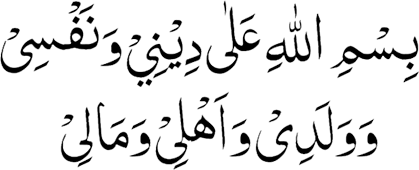
Virtue of reciting Dua for protection: Recite this dua for the protection of ones Imaan, Health, wealth and family.
Reciting Surat-ul-Ikhlas
2nd March 2012
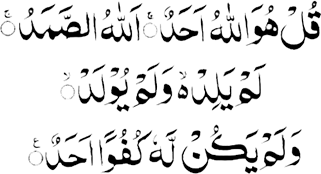
Virtue of reciting Surat‐ul‐Ikhlas: Whosoever recites Surat‐ul‐Ikhlas thrice will get the reward of reading the whole Quraan.
Note: Make a habit of reading it thrice and pass on the reward to the deceased.
Reciting Surat-ul-Kahf
24th February 2012

Virtue of reciting Surat‐ul‐Kahf every Friday: Whoever recites Surat‐ul‐Kahf on Friday will be protected from the dajjaal.
Reciting Surat-u-Yasin
17th February 2012

Virtue of reciting Surat‐u‐Yasin in the morning: Whoever recites Surat‐u‐Yasin in the morning Allah (SWT) will fulfil his desires.
Dua when afflicted with hardships
10th February 2012

Reciting Durood Shareef
27th January 2012

Virtue of reciting Durood Shareef on Friday after As’r Salaat: Sayyidunā Abū Hurayra has narrated that whoever confers the following blessings eighty times before getting up from his place after As’r Salaat on Friday, eighty years of his sins will be forgiven and he will be granted the reward of eighty years of worship.
Reciting Surat-ul-Waqia
13th January 2012

Virtue of reciting Surat‐ul‐Waqia every night: Whoever recites Surat‐ul‐Waqia every night, starvation will not afflict him.
Reciting Surat-ul-Mulk
6th January 2012

Virtue of reciting Surat‐ul‐Mulk before retiring to bed: Whoever recites Surat‐ul‐Mulk before retiring to bed, will be saved from the punishment of the grave.
Due at time of Wasawis
30th December 2011

Dua when leaving the masjid
23rd December 2011

Dua when entering the masjid
16th December 2011

Dua at times of distress
9th December 2011

Dua for Aafiyat
2nd December 2011
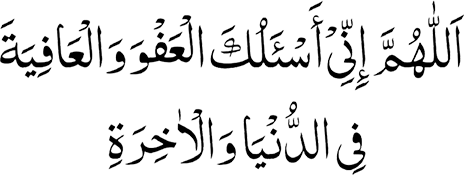
Dua after drinking Zam Zam water
25th November 2011
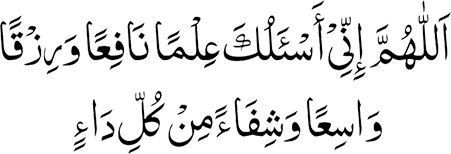
Dua for when exiting the toilet
18th November 2011
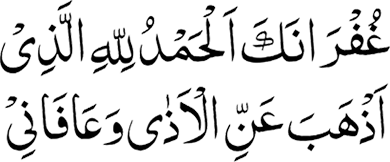
Dua for entering the toilet
11th November 2011

Takbeer-e-Tashreeq
4th November 2011

Virtue of Dua: Beginning from the Fajr of the 9th Zul‐hijjah up to the 'Asr prayer of the 13th, it is obligatory on each Muslim to recite the Takbir of Tashriq after every fard prayer in the following words.
Dua after seeing someone in difficulty
28th October 2011
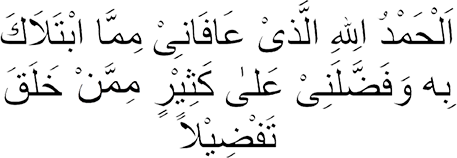
Virtue of Dua: The reciter of this dua will be saved from the difficulties he has seen.
Dua for entering the market
21st October 2011
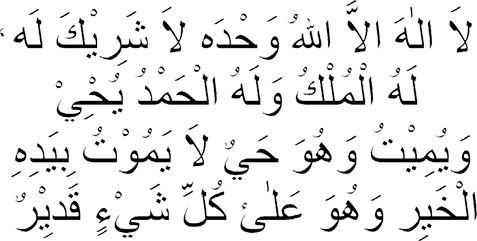
Virtue of Dua: Allah will record for the one who recites the following dua when entering the market place a million rewards and remove million evil deeds and elevate him a million stages. Another narration has: Allah will build a home for him in Paradise.
Dua for protection from all calamities
7th October 2011
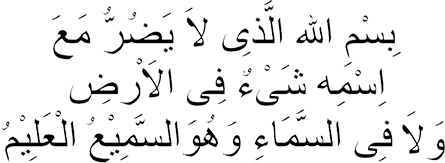
Virtue of Dua: It is mentioned in a Hadith, "Whosoever recites this dua in the morning and evening, no calamity will afflict him".
Tasbeeh for a tree in Paradise
30th September 2011

Virtue of Dua: It is mentioned in a Hadith, "Whosoever recites this dua, a tree will grow for him in jannah".
Dua after Ruku
23rd September 2011

Virtue of Dua: "Our Lord! All praises are for you alone, praises that are abundant and excellent and full of blessings."
Once a sahabah recited the aforementioned dua aloud after ruku. After salaam, the Prophet sallalahu alaihi wasallam enquired who the reciter was. The sahabah came forward and said, "It was I, Oh Rasulullah." The Prophet sallalahu alaihi wasalllam gave him glad tidings that "I saw approximately thirty angels quarrelling as to who would lift the dua onto the heavens and present it to almighty Allah.
Dua between two Sajdahs
16th September 2011

Dua for leaving home
9th September 2011

Virtue of Dua: The Holy Prophet sallalahu alaihi wasallam has said in a hadith that whosoever recites this dua when leaving the home, the angels reply by saying, "You have been granted guidance, you have been saved (from calamities), and you have been taken care of." And he will be protected from shaitaan.
(Sahih al Bukhari)



























